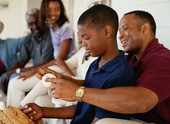
THURSDAY, Oct. 18 (HealthDay News) — The idea that fathers play a significant role in the development of their kids’ approach to sex has received some support in a new evidence review. Studies in the review suggest that adolescents have less sex if their fathers talk to them more about sexual matters.
There are caveats. The review only looked at a few studies because there’s little research into the role of fathers — as compared to mothers — when it comes to the decisions that teens make about sex. And it’s possible that some other factor could explain the apparent link between more fatherly communication and less sexual activity.
Still, the review suggests that “fathers do make a difference. It’s not just about mothers,” said lead author Vincent Guilamo-Ramos, a professor and co-director of New York University’s Center for Latino Adolescent and Family Health.
It’s important to understand how parents affect sexual behavior in their kids because young people are at special risk of unplanned pregnancies and sexually transmitted diseases, Guilamo-Ramos said.
While schools and health-care providers often focus on children directly in efforts to change the way they act, “in study after study, young people say that when it comes to these important decisions, it really matters what their parents think about these issues,” he said.
As for dads, he said, “there hasn’t been a lot of focus on what is it that fathers do other than being present that really contributes to the health and well-being of their adolescent children.”
The review authors found and reviewed 13 studies about the effect that fathers had on the sexual behavior of their kids. The studies suggest — but don’t prove — that communication between fathers and kids is especially influential. The design of the review didn’t allow its authors to determine how much of a statistical effect the fathers had on the number of teens having sex and engaging in risky sex.
Closeness with fathers at the beginning of a study was significantly associated with daughters delaying starting sex after a year of follow-up. A single study on father-son HIV prevention found that more communication about sex was linked to increased abstinence in the six-month study period.
What to do? “It’s not enough to just be connected to your kids and have positive parenting,” Guilamo-Ramos said. “It’s critical that parents communicate their values and provide guidance [to their kids] about how to keep themselves safe.” He believes that should include suggestions about protected sex.
An expert on educational psychology weighed in on the review findings.
Cheryl Somers, director of the school and community psychology program at Wayne State University, cautioned that “it’s critical, as common sense would suggest, to strike a balance between protecting and overprotecting.”
She noted that the review suggests kids are more likely to have sex earlier if they have very strict or very lenient parents.
What about the possibility that giving kids more information about sexuality will encourage them to have sex? “This is simply not supported by research,” said Somers, who’s not connected to the review but worked on one of the reviewed studies.
Overall, she said, the research sends a message: “Fathers do matter — they have a role and they need to know that.”
The study appears online Oct. 15 and in the November print issue of the journal Pediatrics.
More information
For more about teen sexual health, try the U.S. National Library of Medicine.

